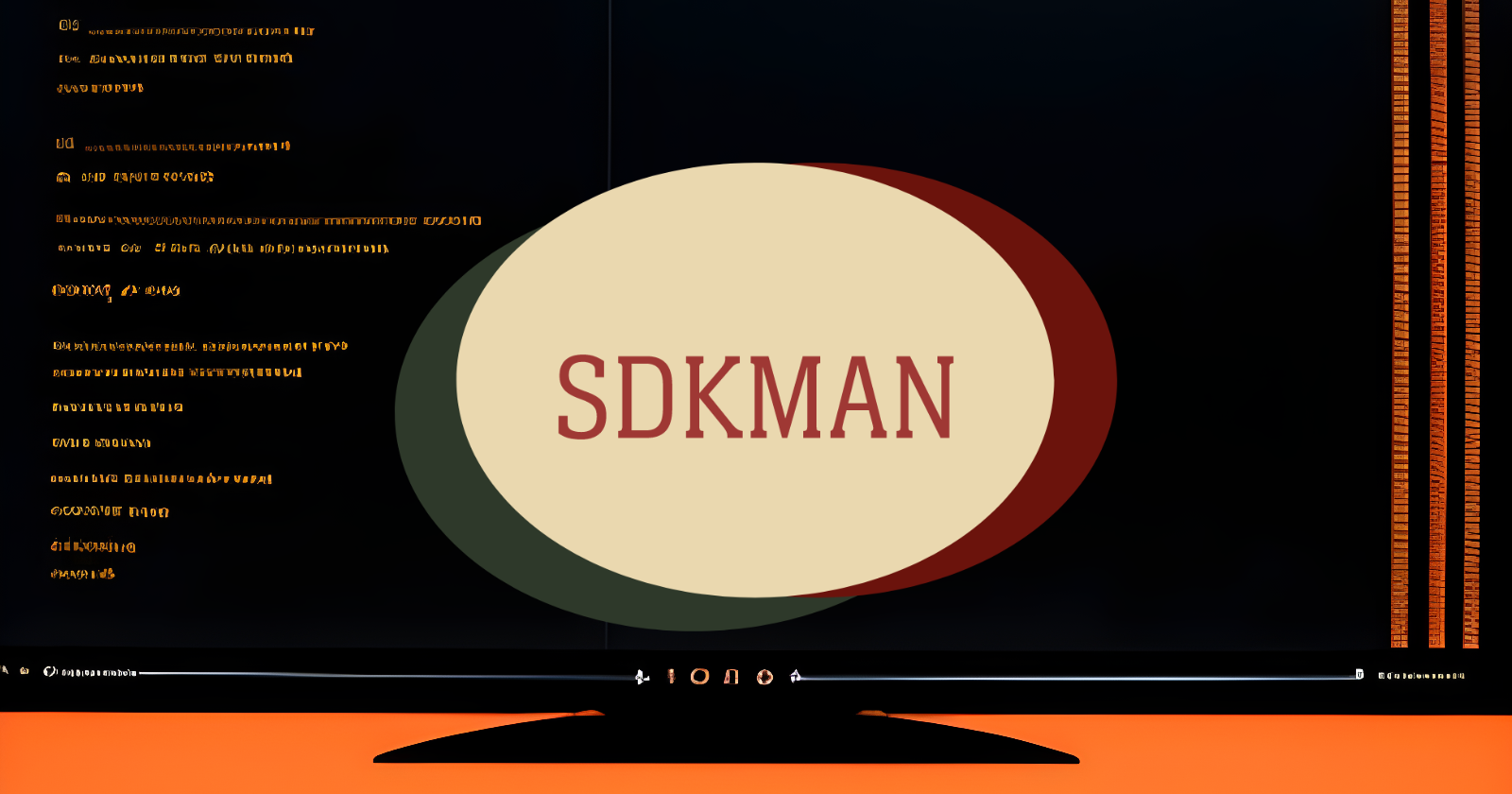Speed up your Java environment setup via SDKMAN
 Dawid Świst
Dawid Świst
Intro
Usually, to install a Java Virtual Machine (JVM) and tools related to the Java language, you have to download a package from the internet, open it, and set some environment variables yourself. This can take a lot of time and be a hassle, especially if you need to change JVM versions or set up a new development environment. While package systems like brew, deb, or rpm might seem to make things easier, they usually only let you have one version of the package at a time, making it hard to switch between versions or manage multiple ones. This is where SDKMAN becomes very useful, providing a neat and easy way to solve these problems.
How to install SDKMAN
Installing SDKMAN on your system is simple, regardless of your operating system. SDKMAN is a useful tool that simplifies managing software development kits (SDKs), especially for Java developers. Follow these steps to install SDKMAN on Linux, FreeBSD, macOS, and Windows.
For Linux, FreeBSD, and MacOS:
Open Your Terminal: Start by opening a terminal window on your system.
Install SDKMAN: Execute the following command in your terminal:
curl -s "https://get.sdkman.io" | bashThis command downloads and runs the SDKMAN installation script.
Initialize SDKMAN: After installation, you'll need to initialize SDKMAN. You can do this by running:
source "$HOME/.sdkman/bin/sdkman-init.sh"This command ensures that SDKMAN is loaded into your current shell session.
Verify Installation: To confirm that SDKMAN is correctly installed, you can use the command:
sdk versionIf the installation is successful, you should see the version number of SDKMAN displayed.
For Windows:
Windows users can also benefit from SDKMAN by utilizing a Bash emulation environment like Git Bash, Cygwin, or Windows Subsystem for Linux (WSL).
Install a Bash Emulation Environment: If you haven't already, install your preferred Bash emulation environment. Windows Subsystem for Linux (WSL) is a popular choice for a more Linux-like experience on Windows.
Follow the Linux Installation Steps: Once your Bash emulation environment is set up, follow the same installation steps as outlined for Linux, FreeBSD, and MacOS.
By following these instructions, you can efficiently install SDKMAN on your system, regardless of your operating system. SDKMAN significantly simplifies the process of managing and switching between different versions of Java tools, making it a must-have utility for developers.
Install your your favourite Java tools
To use SDKMAN for managing Java versions, follow these steps for installing a Java version, setting a default version, and switching between JDK versions:
Install a Specific Java Version:
Open your terminal.
To install a specific version of Java, use the command:
sdk install java <version>Replace
<version>with the version identifier you wish to install. You can find available versions by runningsdk list java.
Set a Default Java Version:
To set a certain Java version as your default, ensuring it's used in every new terminal session, use the command:
sdk default java <version>Again, replace
<version>with the version identifier of the Java version you wish to set as default.
Switch Between JDK Versions for the Current Session:
If you need to switch to a different Java version for the current terminal session only, use:
sdk use java <version>This change will only apply to your current terminal session and will revert to the default version once the session is closed.
By following these steps, you can easily install, manage, and switch between different Java versions using SDKMAN, making it a highly flexible tool for Java development environments.
Certainly! Here are working examples of the commands mentioned:
Install a Specific Java Version:
sdk install java 11.0.2-openThis command installs the OpenJDK version 11.0.2.
Set a Default Java Version:
sdk default java 11.0.2-openThis sets Java version 11.0.2 as the default version for any new terminal session.
Switch Between JDK Versions for the Current Session:
sdk use java 8.0.292-openThis switches the Java version to OpenJDK 8.0.292 for the current terminal session only.
Install Other Tools with SDKMAN
SDKMAN is not just for managing Java versions; it also lets you install and manage various other tools, including build tools, programming languages, frameworks, and software development utilities. This makes it a versatile tool for developers working in the Java ecosystem and beyond. Off corse the tool allows to switch between different versions of these tools.
Examples of Tools You Can Install with SDKMAN
Build Tools:
Maven: A popular build automation tool used primarily for Java projects.
Gradle: A flexible build automation system that supports multi-language development.
SBT: The interactive build tool for Scala and Java projects.
Programming Languages:
Scala: A language that combines object-oriented and functional programming.
Groovy: A powerful, optionally typed and dynamic language, with static-typing and static compilation capabilities.
Frameworks:
Spring Boot: A framework that simplifies the development of new Spring applications.
Micronaut: A modern, JVM-based, full-stack framework for building modular, easily testable microservice applications.
Software Development Utilities:
JBake: A static site/blog generator for developers.
Jetty: A Java HTTP (Web) server and Java Servlet container.
Hadoop: A framework that allows for the distributed processing of large data sets across clusters of computers.
Installation Examples
Here are some examples of how to install these tools using SDKMAN:
Install Scala:
sdk install scala 3.6.3 # or sdk install scala 3.6.3Install Maven:
sdk install mavenInstall Gradle:
sdk install gradleInstall Spring Boot:
sdk install springboot
List of available packages you can find JDK, SDK and tools .
Save your workshop
I understand that changing a Java version or a tool version on the fly can be very useful but not always practical. If you need to switch between different versions and can't always remember which version to use for a project, the SDK provides a feature called sdk env.
The sdk env function in SDKMAN allows for automatic switching of SDK versions based on the project you are working on. It lets you define specific tool versions in a .sdkmanrc configuration file, making it easier to manage environments across different projects. This way, when you enter a project's directory, SDKMAN automatically sets the right tool versions, improving work efficiency.
Let's try something in practice. Let's assume you need to use JDK version 21 Zulu.
First, navigate to your project directory and install SDKMAN, Java 21.0.6-zulu, and Gradle 8.12.1:
sdk install java 21.0.6-zulu # Downloading: java 21.0.6-zulu # In progress...Next, use the
usecommand to set these versions for the current session:sdk use java 21.0.6-zuluThen, utilize
sdk initto save this configuration in the.sdkmanrcfile:sdk env init # .sdkmanrc created. cat ./.sdkmanrc java=21.0.6-zulu
When you return to the project directory next time, SDKMAN and run sdk env install the tick will automatically reads the .sdkmanrc file and use the specified version. If the required packages are not available SDK will install them
cd <your project dir>
sdk env install
#java 21.0.6-zulu is already installed.
#Using java version 21.0.6-zulu in this shell.
java -version
# openjdk version "21.0.6" 2025-01-21 LTS
# OpenJDK Runtime Environment Zulu21.40+17-CA (build 21.0.6+7-LTS)
# OpenJDK 64-Bit Server VM Zulu21.40+17-CA (build 21.0.6+7-LTS, mixed mode, sharing)
Useful Links
SDKMAN project page https://sdkman.io
List of Supported JDK Distributions
List of supported additional SDKs and tools
Summary
SDKMAN simplifies managing multiple Java versions and other software development kits, making it an essential tool for developers. It allows effortless installation, version switching, and configuration across Linux, macOS, Windows, and more through a terminal. With SDKMAN, you can install specific Java versions, set default versions, and switch between them as needed. It also supports various tools beyond Java, including build automation tools, additional programming languages, and frameworks. SDKMAN's `sdk env` feature enhances productivity by automatically adjusting tool versions per project directory with `.sdkmanrc` files.
Subscribe to my newsletter
Read articles from Dawid Świst directly inside your inbox. Subscribe to the newsletter, and don't miss out.
Written by

Dawid Świst
Dawid Świst
I am a programmer who specializes in Java and Scala programming. My specialization is in the creation of telecommunication services for IMS networks using Java, Jain Slee specification, and SIP technology. My interest lies in Swift programming and Cloud technology, specifically designing cloud-based services using micro services and the JVM platform. Astronomy, martial arts, and strategic games are things I enjoy in my free time.